
Construction Estimates: Get It in Writing
Award-winning mason contractor Fred Campbell has learned a lot during his long career in masonry, including one lesson about construction estimates he learned the hard way.
By Jennifer Morrell
If you’ve paid attention, you probably already know about Fred Campbell, a two-time winner of the Spec Mix BRICKLAYER 500 World Championship (2013 and 2015), which is held annually during World of Concrete in Las Vegas. Campbell’s masonry company, Greeneville, Tenn.-based Creative Masonry, sees a lot of success, but you’d better believe that success is hard earned.
From the need for more skilled masons and trade schools to a recognition that workers need to be documented and taxed on their pay, the masonry industry has some serious issues that Campbell says he must address head on in order to effectively run his business.
One issue stands out, however, and it’s a lesson he learned the hard way: Construction Estimates.
“The biggest lesson I’ve learned is to never do anything without getting it all in writing,” Campbell says. “I’ve always been really trustful of people. I know people can trust me, and I expect to be able to trust others. But I’ve learned the importance of getting construction estimates and every other single detail in writing.”
Campbell explains a recent situation, during which he gave a verbal construction estimate for work on a historic Johnson City, Tenn., school that was to be restored and saved from demolition. Although his hourly rate for mason labor was certain and set, the number of hours needed to complete the project landed the invoice on the upper end of the estimate. Still, with nothing in writing, Campbell had nothing to fall back on when the bonding company paid less than half of the amount owed, and offered a mere $2,000 to settle a remaining $32,000 bill.
Having set the hourly rate ahead of the job, Campbell was able to show electronically the exact number of hours clocked and, therefore, the amount owed to his company. So it’s an open and shut case, right? Wrong. He will most likely end up in court to attempt to recoup the money owed to him, and the real winners there, says Campbell, will be the lawyers.
“I have bid jobs up to $950,000 with not a piece of paper signed,” he says. “That used to be ok, but it’s not today. You have to have every single thing in writing – everything. I’ve done it time and again: When a contractor asks for extra work, I assume I’ll get paid. It’s burned me a couple of times.”
Campbell, who is now 45, took over the masonry business from his father at the young age of 18 and actually dropped out of high school to do so. But he was and is a highly skilled mason contractor with the understanding that hiring smart people makes a company thrive. Along the way, he also learned that having and reading contracts, even when it takes a couple of hours, also is important.
“My dad never, ever had a contract with anybody; those days are long gone,” he says. “When a company sends a construction contract agreement, sit down and read it. And, the bigger the company, the more you need to take that hour and a half to read it through. You’ll likely find things in it that are not in your scope of work.”
Campbell takes obvious pride in his trade but reiterates his advice: “Masonry is a tough business, not only because of the demanding conditions, but because of what you have to put up with to make a living,” he says. “So, no matter how small the detail may seem, get it in writing.”
What have you learned?
Pro Masonry Guide wants to share your story. Email Jennifer Morrell at jmorrell@SilverLakeMediaGroup.com.

